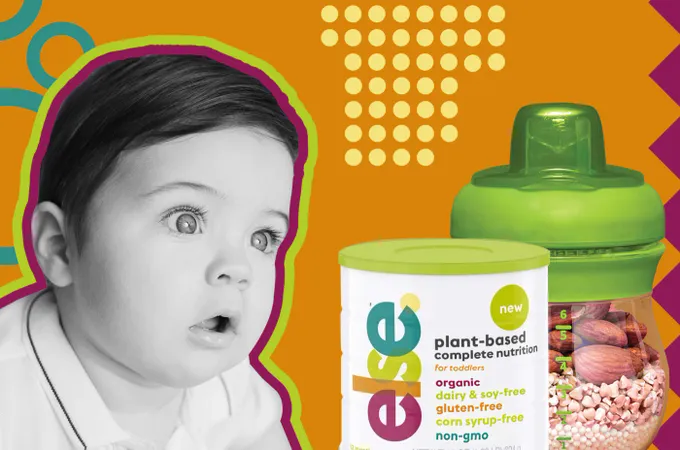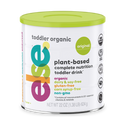Signs You Should Switch to a Soy-Free Formula
Wondering if it's time to switch to a soy-free formula? Look out for these signs and get expert advice on ensuring your baby's nutritional needs are met safely.
Updated May 17, 2024

There are a lot of reasons you may be feeding your child a soy baby formula. Soy formula is one of the few options for plant-based families and also one of the few options for children who are intolerant to milk. However, if your child is exhibiting certain signs or you have certain lifestyle preferences, it may be time to switch to soy-free baby formula. However, is soy free formula good for babies? Read our guide on the signs that your baby is experiencing that may lead you to switching formulas.
1. Your Child is Having an Allergic Reaction
An allergy to soy is actually quite common in infants and children and can cause symptoms that range from extremely uncomfortable to life-threatening. If your child is exhibiting an allergic reaction of any kind, eliminate soy oil and soy products from your child’s diet immediately and consult your doctor. Symptoms of a soy allergy include:
- Hives
- Eczema
- Wheezing
- Trouble breathing
- Coughing
- Digestive Issues
- Vomiting
- Diarrhea
- Itchy, watery, or swollen eyes
- Flushing
- Rapid heartbeat
If your child shows any of these symptoms after drinking soy formula, consult your doctor who will likely suggest switching to a non soy baby formula.
2. Your Child isn’t Sleeping Enough
While they may keep you up frequently at night, babies do sleep a lot—and they need that sleep to support their rapid growth. If your baby is having trouble sleeping or isn’t sleeping the typical 7-8 hours during the day and 8 hours during the night, it could be due to the formula you are feeding them.
3. Your Child is Experiencing Gas
Another sign you may need to switch to a soy-free baby formula is if your child is experiencing gas. If it comes on after every milk formula feeding, your child is probably having difficulty digesting the formula and in need of a change. They may experience more gas than normal and their stomach may feel hard to the touch.
4. Your Child isn’t Gaining Weight
Growth and development are hallmarks of healthy children. In order to grow and develop, though, children need ample nutrition including the macronutrients fat, carbohydrates, and protein. Soy based baby formula is strictly regulated by the Food and Drug Administration to contain adequate macronutrients in addition to a host of important vitamins and minerals. However, the ingredients in soy baby formula could be affecting your child’s digestive system negatively and keep them from gaining weight. This could be due to a food allergy or lactose intolerance to any of the ingredients in the milk formula, or a reaction to a genetically-modified ingredient.
If your child is beyond the stage of consuming infant formula and is drinking soy milk in place of cow’s milk, you may also notice a lack of weight gain. According to the American Academy of Pediatrics, soy milk isn’t a nutritionally adequate substitute for cow’s milk protein for toddlers and older children because it contains less fat than whole milk.
» Discover the key signs that formula isn't suitable for your baby
5. There is Blood in Your Child’s Stool
Your baby’s bowel movements are an excellent indication of their digestive health. For formula fed babies, specifically, constipation is common in the first month or so, however beyond that, signs of irregular bowel movements could indicate you need to switch formula. One of the most serious signs that should lead you to take action is blood in the stool. If this occurs, speak to your doctor right away, as it could be a sign of a food allergy to soy or a reaction to some other ingredient in your baby’s formula.
6. You Are Worried About Your Child’s Sugar Intake
In order to meet the carbohydrates required of all infant formulas by the FDA, and to meet the yummy taste required by little humans, most soy formulas contain incredible amounts of sugar.
As studies have shown, introducing added sugar to infants and young children can put them at greater risk for developing chronic disease as well as obesity, tooth decay, heart disease, high cholesterol, high blood pressure, type 2 diabetes, and fatty liver disease.
If you want to avoid sugar as much as possible, avoiding soy baby formula is a good idea. High sugar content may be disguised as corn syrup solids or sucrose, among other things on ingredient labels, so carefully inspect each ingredient before committing to a specific formula.
7. You Are Concerned About The Effects of Isoflavones
Soybeans contain estrogen mimicking plant compounds called isoflavones. Because estrogen is a powerful hormone, this has raised concern in the past that consuming soy can affect the reproductive system. While there's no hard evidence that feeding soy formula to babies leads to reproductive problems, the long term effects haven’t been studied enough to be conclusive. For this reason, if you are concerned about the potential side-effects of isoflavones, switching to a soy-free formula could give you more peace of mind.
8. You Want The Cleanest Possible Ingredients
While every formula is created to provide proper nutrition, not every formula is created equal. Unfortunately, soybeans are one of the most common crops to be genetically modified and so many soy-based baby formulas contain GMOs. Additionally, these formulas often contain synthetic preservatives, unnatural sugars, and harmful oils. If you are looking for a clean source of protein, fat, and carbohydrates for your child, you will need to look beyond soy-based formula.
» Discover alternatives to Enfagrow toddler formula
9. You Want A More Nutritiously Rich Option
As we mentioned above, infants and toddlers require high levels of carbohydrates and fats, as well as some protein to grow and develop, but that’s not all they need. They also need vitamins, minerals, and phytonutrients to thrive.
Else Nutrition Plant-Based Nutrition for Toddlers is formulated as a nutritious and delicious supplement for your toddler’s growth and development. It is a great source of protein, but also of calcium, iron, fiber, and healthy fats as well as vitamins D and B12. It also contains the whole food, gluten-free carbohydrates toddlers need. In addition to being gluten-free, the formula is low in sugar and free from corn syrup, yet tastes delicious. For families who pursue a plant-based lifestyle, Else is an incredible choice.
How To Switch Formulas
Whenever you are switching your child’s diet, do so with the consultation of your pediatrician and pay careful attention to your child’s response to ensure they don’t react negatively to a new formula. If you think your child may be allergic to the formula, and/or they are experiencing severe symptoms, your pediatrician will likely recommend an immediate switch to a soy-free formula.
In other cases, however, a slow transition from a soy formula to a soy-free formula may be more comfortable for your child, and may allow you to continue to use, rather than waste, any formula you already have on hand. If you decide a slow transition is the right course of action, you will mix the old and new formulas to varying degrees until your child is fully transitioned. For example, if your child consumes 4 oz of formula at each feeding, start by mixing 3 oz of the current formula with 1 oz of the new formula. After a couple of days, given no adverse side-effects, mix 2 oz of the current formula with 2 oz of the new formula. Continue to decrease the old formula by 1 oz and increase the new formula by 1 oz until your child is completely transitioned to the new formula.
A slow transition will help you identify if your child is reacting positively or negatively to the change in formula. You may even discover that what your baby needs is actually a mix of two different kinds of formula.
Transitioning to Toddler Formula
If your child is over one year old, consider transitioning them to Else Complete Nutrition for Toddlers. At this point in their life, your child needs supplemental nutrition that is different than what they were receiving as an infant. Their nutritional needs change and they are also eating regular food products so toddler formula is especially designed to provide what they not be getting from food. Traditionally, the main difference between toddler and infant formulas is that toddler formulas slightly differ in their protein levels and contain greater amounts of calcium and phosphorus to match the higher calcium and phosphorus levels children need as they grow.
Nutrient-rich toddler drinks are often recommended by health care professionals when there is a recognized need for additional nutrients that may be lacking in your toddler’s diet.
It is always best to ask your pediatrician about any nutrition concerns related to your toddler or infant’s diet before switching, adding, or removing any formula. Your baby’s body is constantly changing, and so it’s totally normal to need to adjust their diet accordingly. Additionally, the more you learn, the more you may feel led to choose a formula that aligns with your values and provides the very best for your child.
*The content and advice provided in this article is for informational purposes only and is not a substitute for medical diagnosis, treatment, or advice for specific medical conditions. Always consult a pediatrician to understand the individual needs of your child.












